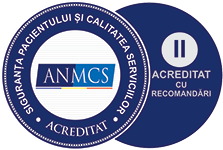ORL is short for otorhinolaryngology, which is the branch of medicine used to prevent, diagnose and treat diseases of the ear, nose, throat, upper airways and sinuses.
The ORL or ear, nose and throat specialist is a therapist and surgeon and treats conditions:
- Of the nose, such as sinusitis, allergic rhinitis, nasal polyps, nasal septum perforation, deviated septum
- Throat, such as laryngitis, pharyngitis, mumps, tonsillitis
- Ears, such as otitis, eustachitis, tinnitus, ear canal boils, sulphur plugs, hearing loss, ear lesions.
Often, diseases of the nose, throat and ears are closely related, so the ENT consultation is holistic, comprising an anamnesis (history of own or family medical history), clinical and paraclinical examination (nasopharyngeal endoscopy (fibroscopy), audiometry, imaging investigations (MRI, CT), laboratory tests).
The diagnosis of ORL conditions is established following a full ORL examination and recommendations for further investigation can be made for more complex conditions that may also have neurological and/or infectious dimensions (e.g. extreme otitis).
Treatment may include both medicinal remedies and surgical interventions – such as tonsil excision for acute tonsillitis or septoplasty for a problematic deviated septum.
!!!!!! It is important to see an ORL specialist if you experience one or more of the symptoms listed below:
- Nose breathing problems
- Nosebleeds
- Dizziness or lightheadedness
- Tinnitus (persistent ringing in the ears)
- Diminished sense of smell
- Sinus pain
- Swelling in the throat (pain or burning when swallowing)
PREVENTION METHODS
To prevent the discomfort caused by ORL diseases, it is recommended that you take some simple preventive measures.
Prevention of nasal diseases includes:
- avoiding smoking or exposure to cigarette smoke
- avoiding exposure to potentially allergenic factors (pollen, chemical irritants)
- avoiding exposure to cold and damp
Ear disease prevention includes:
- avoiding respiratory infections
- avoiding sinus infections
- avoiding cold, damp, cigarette smoke
- avoiding sources of loud sound/noise
Prevention of throat diseases includes:
- avoiding smoking or cigarette smoke
- avoiding exposure to cold and/or damp
- avoiding very hot or very cold drinks or food
- avoiding exposure to risky environments (contact with infectious people)





 Română
Română English
English